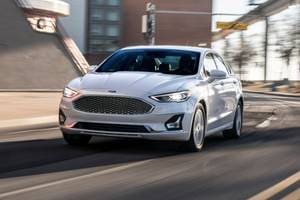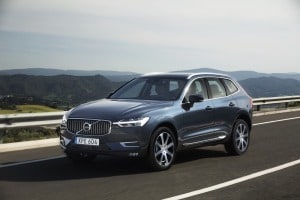Edmunds.com Reports Automakers' True Cost of Incentives: Chrysler Surpasses GM in Relative Spending While Trying New Pricing Strategy
FOR IMMEDIATE RELEASE
Edmunds.com Reports Automakers' True Cost of Incentives: Chrysler Surpasses GM in Relative Spending While Trying New Pricing Strategy
Santa Monica, CA - March 2, 2004 - Edmunds.com, the premier online resource for automotive information, reported today that the average manufacturer incentive per vehicle sold in the United States was $2,365 in January 2004, up $343, or 17%, from January 2003, and down $90, or 3.7%, from December 2003.
Edmunds.com's monthly True Cost of IncentivesSM (TCISM) report takes into account all of the manufacturers' various United States incentives programs, including subvented interest rates and lease programs as well as cash rebates to consumers and dealers. To ensure the greatest possible accuracy, Edmunds.com bases its calculations on sales volume, including the mix of vehicle makes and models for each month, as well as on the proportion of vehicles for which each type of incentive was used.
"The meteoric rise of incentives spending over the past few years has been largely driven by a desire for market share, especially by the domestic manufacturers, but we are starting to see evidence of a change in focus," stated Dr. Jane Liu, Executive Director of Data Analysis for Edmunds.com. "Starting with the 2004 model year and becoming more apparent with the 2005 model year vehicles, automakers are rediscovering the importance of profitability and are hoping to achieve it through a new pricing strategy of setting sticker prices closer to actual transaction prices, aiming to eliminate the expectation of large cash rebates and low APR programs and letting each vehicle sell itself."
Perhaps the best example of this is the redesigned Dodge Durango. For the 2004 model year, the new Durango has many updates and additional features, and yet its average sticker price including typical options show a drop of $1,230 from the lesser-contented 2003 model. But the average net price (new vehicle transaction prices adjusted for manufacturer incentives costs) is $32,333 for the 2004 Durango, significantly higher than the more expensive 2003 version's $26,942 net price. Put another way, the difference between the 2004 Durango sticker price and net price was just $1,734 in January 2004 while the difference for the 2003 model was $6,813 in January 2003. And the 2003 model took an average of 77 days to be sold off a dealer's lots while the 2004 model took just 22 days.
"The Durango is an example of the future strategy being discussed by the domestic automakers," remarked Dr. Liu. "And the strategy seems to be working well, as long as it is employed for products as desirable to consumers as the 2004 Durango has been so far."
Overall, combined incentives spending for domestic Chrysler, Ford and General Motors nameplates increased by 0.4% to $3,354 per vehicle in January compared with $3,339 in December. For the first time since September 2002, Chrysler surpassed GM in incentives spending, reaching a company-high of $3,851 per vehicle, up 12.8% over the previous month. Chrysler concurrently gained 0.3% in market share. General Motors' incentives spending decreased by 3.1% to $3,479 per vehicle while its market share experienced one of its sharpest monthly drops ever, falling 4.4% points to 26.1%. Ford's incentives spending declined by 1.3% to $2,829 per vehicle in January while its market share was essentially unchanged at 18.7%.
In the same period, Korean automakers spent $1,692, European automakers spent $1,292 and Japanese automakers spent $879 per vehicle sold.
Of all brands, Lexus spent the least on incentives at $153 per vehicle, followed by Hummer at $277 per vehicle. At the other end of the spectrum, Oldsmobile spent the most incentives dollars per vehicle at $4,869, followed by Cadillac at $4,843.
Among vehicle segments, large cars had the highest average incentives last month at $3,868, followed by large SUVs at $3,403 and minivans at $2,865. Luxury SUVs had the lowest average incentives at $1,121, followed by compact cars at $1,751 and sport cars at $1,844. Large SUVs have gained the most market share since January 2003, increasing from 3.8% to 5.9%, while midsize cars have lost the most market share during that period, down from 19.7% to 16.7%.
Industry average days-to-turn, which measures how many days on average it took to sell vehicles after they arrived at dealerships, was 64 days in January, compared to 61 in December 2003 and 63 in January 2003. Isuzu had the longest days-to-turn at 136, followed by Oldsmobile at 109. The quickest inventory turnaround was for Mini 22 days, followed by Lexus at 23 days.
About Edmunds.com True Cost of IncentivesSM (TCISM)
Edmunds.com's TCISM is a comprehensive monthly report that measures automobile manufacturers' cost of incentives on vehicles sold in the United States. These costs are reported on a per vehicle basis for the industry as a whole, for each manufacturer, for each make sold by each manufacturer and for each model of each make. TCI covers all aspects of manufacturers' various incentives programs (except volume and similar bonus programs), including dealer cash, manufacturer rebates and consumer savings from subvented APR and lease programs (including subvented lease residual values used in manufacturer leasing programs). Data for the industry, the manufacturers and the makes are derived using weighted averages and are based on actual monthly sales and financing activity.
About Edmunds
Edmunds.com is the premier online resource for automotive information. Its comprehensive set of data, tools and services, including Edmunds.com True Market Value® pricing, is generated by Edmunds Data Services and is licensed to third parties. For example, the company supplies over 800,000 pages of content for the auto sections of AOL and NYTimes.com, provides weekly data to Automotive News and delivers monthly data reports to Wall Street analysts. Edmunds.com was named "best car research" site by Forbes ASAP, has been selected by consumers as the "most useful Web site" according to every J.D. Power and Associates New Autoshopper.com StudySM and was ranked first in the Survey of Car-Shopping Web Sites as reported by The Wall Street Journal. The company is headquartered in Santa Monica, California and maintains a satellite office in Troy, Michigan.








